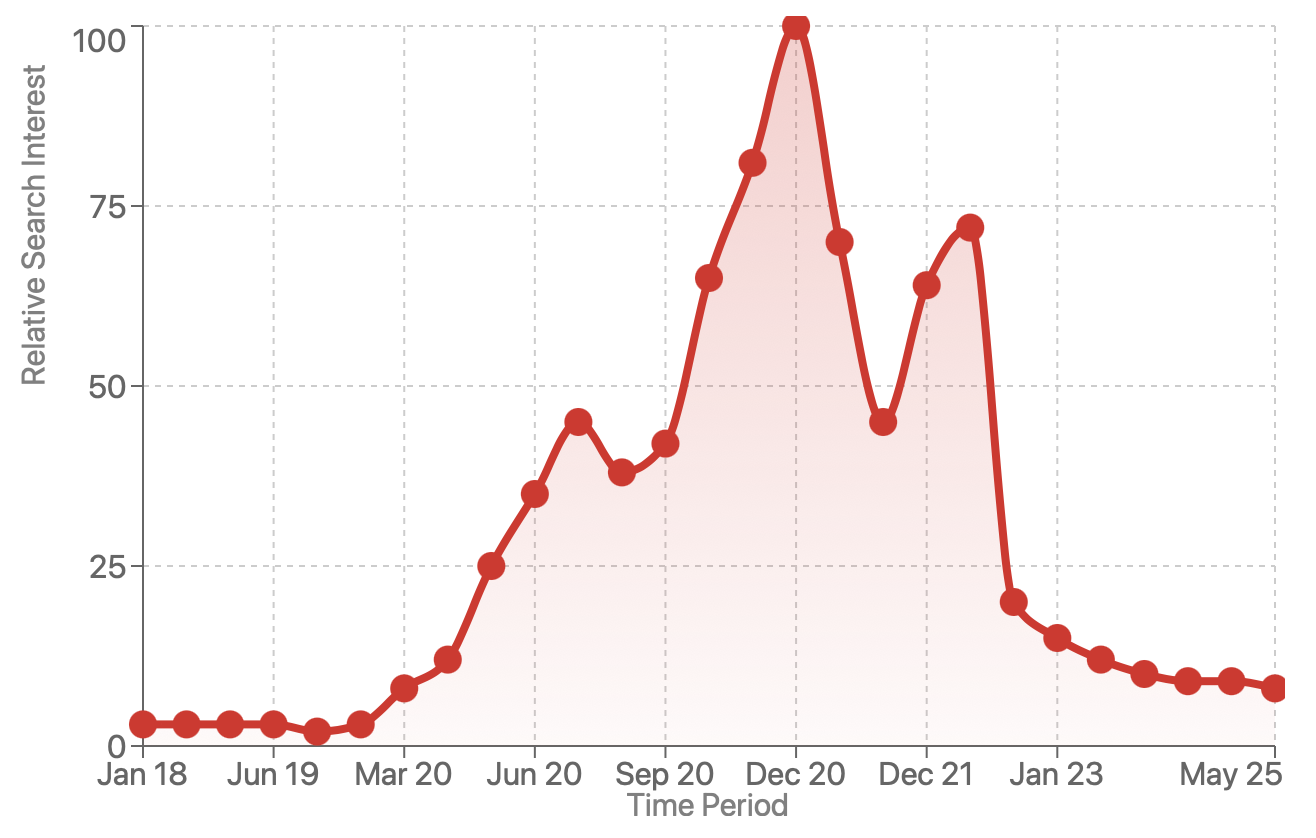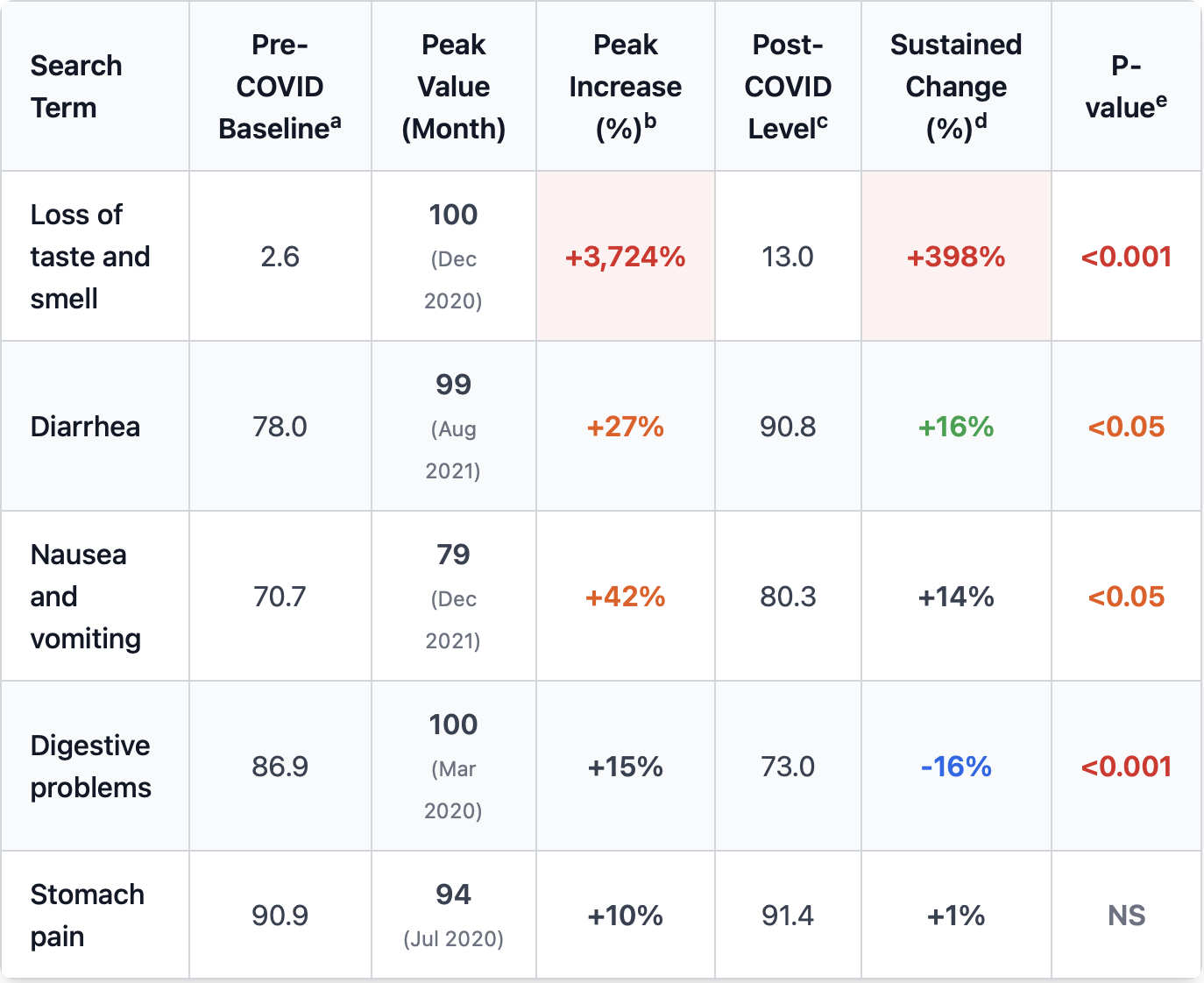Tuesday Poster Session
Category: Practice Management
P6179 - The COVID-19 Pandemic's Lasting Impact on Public Awareness of Gastrointestinal Symptoms: A National Google Trends Analysis
Tuesday, October 28, 2025
10:30 AM - 4:00 PM PDT
Location: Exhibit Hall
- EP
Ewurabena N. Plange-Kaye, DDS
Columbia University
Dumont, NJ
Presenting Author(s)
John K. Appiah, MD1, Ewurabena N. Plange-Kaye, DDS2, Emmanuel Asare, 3, Evans Donneyong, MD4, Emmanuel Asiedu, MD5
1Geisinger Wyoming Valley Medical Center, Wilkes-Barre, PA; 2Columbia University, Dumont, NJ; 3Montefiore hospital, Bronx, NY; 4Tamale Teaching Hospital, Tamale, Northern, Ghana; 5Mother and Child Hospital, Accra, Central, Ghana
Introduction: The COVID-19 pandemic highlighted the importance of gastrointestinal symptoms, particularly loss of taste and smell, as early indicators of infection. However, the long-term impact of pandemic awareness campaigns on public health-seeking behavior for GI symptoms remains unclear. We analyzed Google search patterns to quantify pandemic-driven changes in GI symptom awareness and assess their persistence over time.
Methods: Google Trends data were collected for five key search terms; “loss of taste and smell,” “nausea and vomiting,” “diarrhea,” “stomach pain,” and “digestive problems”, from January 2018 through May 2025 across all U.S. states. We defined three distinct periods: pre-pandemic (January 2018 to February 2020), pandemic peak (March 2020 to December 2021), and post-pandemic (January 2022 to May 2025). Relative search interest was compared across time periods using interrupted time series analysis and t-tests, with geographic distribution patterns analyzed separately.
Results: Searches for loss of taste and smell demonstrated the most dramatic increase, rising from a pre-pandemic baseline of 2.6 to a peak of 100 in December 2020 (3,724% increase, p< 0.001), with a sustained post-pandemic elevation to 13.0 (398% above baseline, p< 0.001). Diarrhea-related searches increased 27% at peak and remained elevated by 16% post-pandemic (p< 0.05). Nausea and vomiting searches showed a 12% peak increase and a 14% sustained elevation (p< 0.05). Digestive problems peaked 15% above baseline but declined 16% post-pandemic, suggesting a shift toward more specific health inquiries. Stomach pain, used as a negative control, showed minimal change (3% peak, 1% sustained; p=0.45). Geographic analysis revealed highest sustained interest in Pennsylvania, Montana, Iowa, and North Dakota, with marked rural-urban disparities and correlations between search intensity and regional COVID-19 outbreak severity.
Discussion: The COVID-19 pandemic permanently altered public health-seeking behavior, creating unprecedented awareness of specific GI symptoms while increasing overall health literacy. These population-level behavioral changes demonstrate the effectiveness of pandemic health communication and provide a novel framework for measuring public health education impact. Geographic disparities reveal opportunities for targeted interventions, while the digital epidemiology methodology offers valuable insights for future health emergency preparedness.

Figure: Figure 1. Relative search interest for "loss of taste and smell" from January 2018 through May 2025, showing unprecedented increase during COVID-19 pandemic. Search interest increased from pre-pandemic baseline of 2.6 to peak of 100 in December 2020 (3,724% increase), with sustained elevation at 13.0 post-pandemic (398% above baseline). Data source: Google Trends.

Figure: Table 1. Google Trends analysis of gastrointestinal symptom search patterns during the COVID-19 pandemic (January 2018–May 2025). Values represent relative search interest on a 0–100 scale. ᵃPre-COVID baseline refers to the mean relative search interest from January 2018 to February 2020 (26 months). ᵇPeak increase reflects the maximum percentage increase observed during the pandemic period from March 2020 to December 2021. ᶜPost-COVID level represents the mean relative search interest from January 2022 to May 2025 (41 months). ᵈSustained change indicates the percentage difference between the pre-COVID baseline and post-COVID period. ᵉP-values reflect the statistical significance of sustained change based on interrupted time series analysis. NS denotes non-significant results (p > 0.05).
Disclosures:
John Appiah indicated no relevant financial relationships.
Ewurabena Plange-Kaye indicated no relevant financial relationships.
Emmanuel Asare indicated no relevant financial relationships.
Evans Donneyong indicated no relevant financial relationships.
Emmanuel Asiedu indicated no relevant financial relationships.
John K. Appiah, MD1, Ewurabena N. Plange-Kaye, DDS2, Emmanuel Asare, 3, Evans Donneyong, MD4, Emmanuel Asiedu, MD5. P6179 - The COVID-19 Pandemic's Lasting Impact on Public Awareness of Gastrointestinal Symptoms: A National Google Trends Analysis, ACG 2025 Annual Scientific Meeting Abstracts. Phoenix, AZ: American College of Gastroenterology.
1Geisinger Wyoming Valley Medical Center, Wilkes-Barre, PA; 2Columbia University, Dumont, NJ; 3Montefiore hospital, Bronx, NY; 4Tamale Teaching Hospital, Tamale, Northern, Ghana; 5Mother and Child Hospital, Accra, Central, Ghana
Introduction: The COVID-19 pandemic highlighted the importance of gastrointestinal symptoms, particularly loss of taste and smell, as early indicators of infection. However, the long-term impact of pandemic awareness campaigns on public health-seeking behavior for GI symptoms remains unclear. We analyzed Google search patterns to quantify pandemic-driven changes in GI symptom awareness and assess their persistence over time.
Methods: Google Trends data were collected for five key search terms; “loss of taste and smell,” “nausea and vomiting,” “diarrhea,” “stomach pain,” and “digestive problems”, from January 2018 through May 2025 across all U.S. states. We defined three distinct periods: pre-pandemic (January 2018 to February 2020), pandemic peak (March 2020 to December 2021), and post-pandemic (January 2022 to May 2025). Relative search interest was compared across time periods using interrupted time series analysis and t-tests, with geographic distribution patterns analyzed separately.
Results: Searches for loss of taste and smell demonstrated the most dramatic increase, rising from a pre-pandemic baseline of 2.6 to a peak of 100 in December 2020 (3,724% increase, p< 0.001), with a sustained post-pandemic elevation to 13.0 (398% above baseline, p< 0.001). Diarrhea-related searches increased 27% at peak and remained elevated by 16% post-pandemic (p< 0.05). Nausea and vomiting searches showed a 12% peak increase and a 14% sustained elevation (p< 0.05). Digestive problems peaked 15% above baseline but declined 16% post-pandemic, suggesting a shift toward more specific health inquiries. Stomach pain, used as a negative control, showed minimal change (3% peak, 1% sustained; p=0.45). Geographic analysis revealed highest sustained interest in Pennsylvania, Montana, Iowa, and North Dakota, with marked rural-urban disparities and correlations between search intensity and regional COVID-19 outbreak severity.
Discussion: The COVID-19 pandemic permanently altered public health-seeking behavior, creating unprecedented awareness of specific GI symptoms while increasing overall health literacy. These population-level behavioral changes demonstrate the effectiveness of pandemic health communication and provide a novel framework for measuring public health education impact. Geographic disparities reveal opportunities for targeted interventions, while the digital epidemiology methodology offers valuable insights for future health emergency preparedness.

Figure: Figure 1. Relative search interest for "loss of taste and smell" from January 2018 through May 2025, showing unprecedented increase during COVID-19 pandemic. Search interest increased from pre-pandemic baseline of 2.6 to peak of 100 in December 2020 (3,724% increase), with sustained elevation at 13.0 post-pandemic (398% above baseline). Data source: Google Trends.

Figure: Table 1. Google Trends analysis of gastrointestinal symptom search patterns during the COVID-19 pandemic (January 2018–May 2025). Values represent relative search interest on a 0–100 scale. ᵃPre-COVID baseline refers to the mean relative search interest from January 2018 to February 2020 (26 months). ᵇPeak increase reflects the maximum percentage increase observed during the pandemic period from March 2020 to December 2021. ᶜPost-COVID level represents the mean relative search interest from January 2022 to May 2025 (41 months). ᵈSustained change indicates the percentage difference between the pre-COVID baseline and post-COVID period. ᵉP-values reflect the statistical significance of sustained change based on interrupted time series analysis. NS denotes non-significant results (p > 0.05).
Disclosures:
John Appiah indicated no relevant financial relationships.
Ewurabena Plange-Kaye indicated no relevant financial relationships.
Emmanuel Asare indicated no relevant financial relationships.
Evans Donneyong indicated no relevant financial relationships.
Emmanuel Asiedu indicated no relevant financial relationships.
John K. Appiah, MD1, Ewurabena N. Plange-Kaye, DDS2, Emmanuel Asare, 3, Evans Donneyong, MD4, Emmanuel Asiedu, MD5. P6179 - The COVID-19 Pandemic's Lasting Impact on Public Awareness of Gastrointestinal Symptoms: A National Google Trends Analysis, ACG 2025 Annual Scientific Meeting Abstracts. Phoenix, AZ: American College of Gastroenterology.
